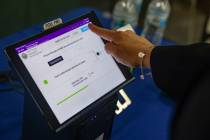Rights leaders raise profiling issue
Civil rights leaders worry that a new agreement between immigration officials and Las Vegas police could lead to racial profiling and make people afraid to report crimes.
The agreement between the Metropolitan Police Department and the U.S. Bureau of Immigration and Customs Enforcement allows some officers at the Clark County Detention Center to identify immigration violators and initiate deportation proceedings against them.
Such agreements inspire fear in immigrant communities, said Maggie McLetchie, a staff attorney for the American Civil Liberties Union of Nevada.
"Whatever the actual scope is, the public perception is going to be that Metro equals ICE," she said. "Even people who are not wrongdoers, even victims of crime are going to be deterred from cooperating with police."
Meanwhile ICE officials and Las Vegas police remained tight-lipped about details of their so-called 287 (g) partnership, which is expected to substantially increase deportations of local foreign-born criminals who are jailed.
The partnership's name comes from the corresponding section of the federal Immigration and Nationality Act.
ICE would not provide a copy of its memorandum of understanding with police.
A police spokesman said the department will release more information at a news conference this week.
The agreement, the first of its kind in Nevada, empowers specially trained local corrections officers to do some forms of immigration policing. After a person has been arrested and taken to jail, designated officers will determine that person's legal status and "deportability," according to ICE.
The agreement will affect only those who have already been arrested on other charges, ICE said.
Sheriff Doug Gillespie has declined to comment on the agreement recently, but told the Review-Journal late last year that any such partnership would be limited to the jail and would not affect a long-standing department policy that prevents local police on the street from asking potential immigration violators about their legal status.
McLetchie said the partnership will affect police's ability "to keep the community safe, because people are going to be deterred from reporting crimes."
"Metro's job is not to enforce immigration law, but to ensure the safety of our communities," she said.
Nationally, 63 local and state police groups have immigration partnerships, according to ICE.
Though 287 (g) agreements are meant to target criminals who may be in the country illegally, independent law enforcement agencies sometimes overstep those parameters, which can lead to racial profiling, said Cesar Perales, president and general counsel of the LatinoJustice PRLDEF, formerly the Puerto Rican Legal Defense and Education Fund, a New York-based Latino advocacy organization.
"You have situations in which police stop people for traffic citations and try to identify whether people are in the country" illegally, he said. "That's wrong. That's not the purpose of police."
He declined to name municipalities that he believes have abused 287 (g) agreements.
Arizona's Maricopa County Sheriff's Office entered into a 287 (g) agreement with ICE in February 2007. A spokesman for the office refused to comment about the partnership.
The Arizona Republic recently reported on allegations that Sheriff Joe Arpaio's office violated the ICE agreement by targeting day laborers instead of violent criminals and violated the civil rights of Hispanics.
The Republic also referenced the partnership in conjunction with the newspaper's investigation into recent arrest records.
Arpaio has vehemently denied his deputies were profiling, and federal officials said they found no violations of the agreement that allows deputies there to enforce some immigration laws, according to the newspaper.
Locally, 10 corrections officers have undergone several weeks of training with ICE officials as part of the 287 (g) agreement, a Las Vegas police spokesman said.
The officers will have access to a federal database of known immigration violators that will tell them whether an inmate has been deported before or if the citizenship status of that inmate is in question, the spokesman said.
Officials wouldn't say whether the names of every inmate booked into the Clark County Detention Center would be run through the database, or whether only the names of suspected immigration violators would be run.
If an inmate is flagged in the software program, that information will be passed along to ICE officials.
Jail officials also will be authorized to put immigration detainers on inmates determined to be legally deportable, allowing ICE to step in upon resolution of criminal cases.
Immigrants convicted of crimes are deported only after serving their sentences in this country, under current law.
Inmates who could end up targeted for deportation include formerly legal residents who lost their legal status after being convicted of crimes.
The Metropolitan Police Department applied for the partnership last year. ICE officials say enforcement efforts are more effective in areas with such agreements.
Increasing state and local partnerships is the cornerstone of ICE's "Secure Communities" plan, which aims to target foreign-born criminals in jails nationwide.
Last year, ICE brought immigration charges against about 164,000 foreign-born inmates nationally, up from 67,000 in 2006. The agency deported some 95,000 foreign-born criminals last year.
ICE was unable to provide the number of foreign-born inmates deported locally.
Contact reporter Lynnette Curtis at lcurtis@reviewjournal.com or 702-383-0285.























